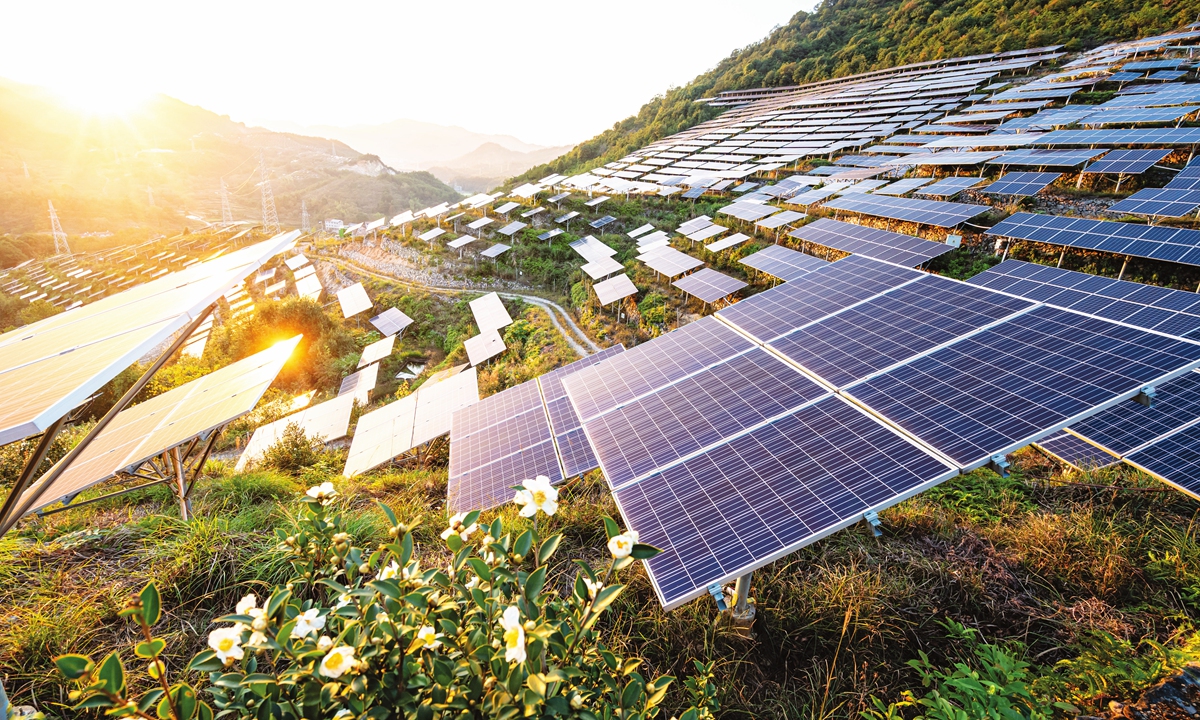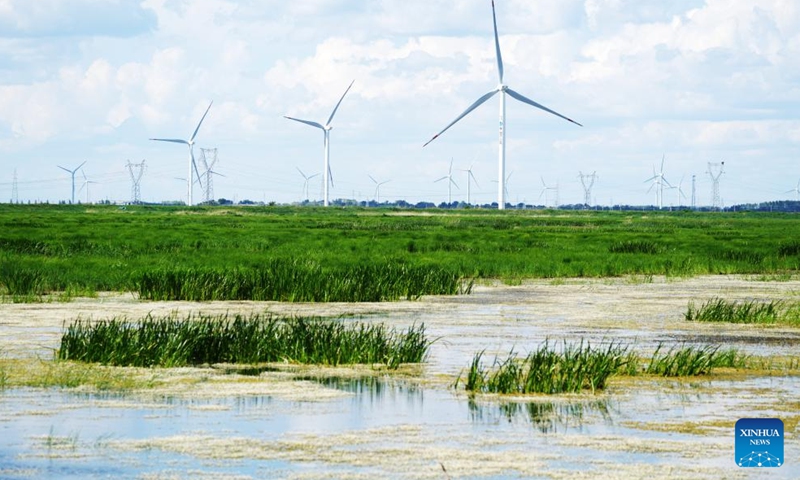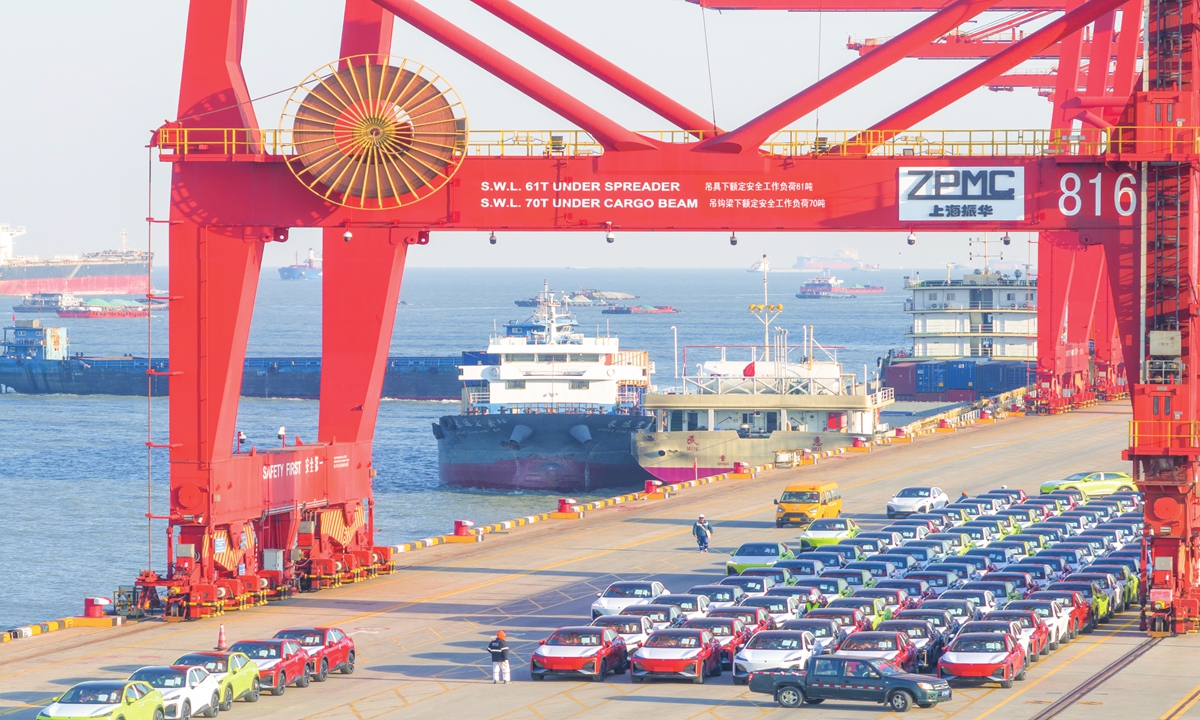China leads the way in championing clean energy development: IEA Executive Director

Photo:VCG
Editor's Note:
According to the 2024 Chinese government work report submitted on March 5 to the national legislature for deliberation, China will advance the energy revolution and actively and prudently work toward peaking carbon dioxide emissions and achieving carbon neutrality. In fact, the country has been a global leader in green and low-carbon development for years. How is the global renewable energy sector developing? What role is China playing? What can we expect from China's further endeavors to promote sustainable development? Global Times (GT) reporter Xu Hailin discussed these issues with International Energy Agency (IEA) Executive Director Dr Fatih Birol (Birol).
GT: The IEA, in its report "Electricity 2024: Analysis and forecast to 2026," predicted that "on a global scale, low-carbon generation is set to meet all the additional demand growth towards 2026." What is the current status of development in the renewable energy sector? What are the challenges and opportunities facing the world's energy transition?
Birol: Global electricity consumption is going to grow strongly driven by China, India and other developing countries. But this growth will be met mainly by the renewables and a bit coming from nuclear power. So it means clean energy technologies alone will be able to cover all the growth in global electricity needs. This is very important for the decarbonization of the energy system. Here, an important thing is - when I say renewables, the most important one is solar energy, because solar energy is getting cheap. And many countries, including those in the emerging world, choose solar power, which is the first option when there is a need for power plants.
In terms of solar energy, China is the champion of the world. China's solar installment is by far the biggest contribution to global solar deployment. But in addition to renewables, we are also seeing that nuclear power is making a comeback. Our report shows that around 2025, global nuclear electricity generation will reach an all-time high, a record high. All in all, the big growth in renewables driven by solar energy as well as the increasing use of nuclear generation, means that a global electricity demand growth will be covered by the low-carbon electricity generation.
GT: As you have just mentioned, China is a champion in some sectors of clean energy. How can China help the global energy transition?
Birol: When we talk about clean energy in the world today, China is by far the No.1. China is No.1 in solar, No.1 in the wind, No.1 in electric cars and No.1 in nuclear power additions. In terms of solar energy or wind, China is building a huge amount of solar and renewable energy plants at home to bring the emissions down. By bringing the cost of these technologies down, China is providing a service to other countries, making clean energy technologies more affordable to other nations in the world.
Therefore, China's contribution to the decarbonization of the energy system is very good. But at the same time, China has challenges to address, such as the large-scale contribution of coal power to its electricity mix. So, China is leading the way in championing clean energy technologies domestically and supporting the development of clean energy in other countries by reducing costs.
GT: In recent years, China has been striving to reduce the use of fossil energy and reduce coal output. How do you evaluate China's efforts?
Birol: I think China's efforts to reduce the use of fossil fuels is very good news first of all for China, because of the air pollution in the cities, and also because China's reliance on other countries, both economically and also politically, will be reduced due to those efforts. Today, China is the leader in electric car sales around the world, with almost every three cars sold in China being electric. This means China's oil import, oil demand and needs are becoming lower with the electrification of car transportation, including the electrification of the buses. This is excellent news. China is accelerating the development of renewables such as solar, wind, hydropower and nuclear power. I hope this will also lead to a decrease in the use of coal, because it is a major problem for China, both in terms of China's CO2 emissions and local pollution in the cities.
Given the size of China, it is a major problem for the world as well. So, I appreciate China's efforts to decarbonize its transportation sector by moving away from oil. I also appreciate China's efforts to decarbonize the power sector by using more renewables, more nuclear power and significantly reducing the share of coal.
GT: Regarding the global energy transition, China is moving to use cleaner and greener energy. In this field, the developed countries are in a leading position, and most developing countries are catching up. China has proposed "building a green Silk Road" and the Global Development Initiative to support the development of renewable energy and energy transition in other developing countries. What's your take on China's role in supporting the transition in other developing countries?
Birol: Climate change is a global problem. For example, even if tomorrow the emissions in Europe would go to zero, if the other countries around the world would continue with the current energy policies, the climate in Europe will still be badly affected. Emissions going into the atmosphere from Beijing, Brussels, Detroit or Jakarta have the same effect on the citizens of this world. Emissions don't have a passport.
Therefore, it is important that clean energy growth is not only in the advanced economies. It must happen around the world. But when we look at the numbers, we see a rather disappointing picture. Today, all clean energy investments in renewables around the world, solar, wind and electric cars are about $1.8 trillion. But the share of this $1.8 trillion for the developing countries is only 15 percent. While these countries constitute the majority of the global population, their share of clean energy investment is very small. Here, especially the biggest problem is for Africa, the continent that would have the most catastrophic implications from climate change.
Now, therefore, there is a need for countries that are advanced in clean energy technologies to support emerging countries, especially those in Africa, Asia and Latin America. We also need China, the US, Europe, Japan, South Korea and Australia to support the developing countries in clean energy transition efforts in different ways, through different means and different instruments.
At the same time, I believe that it is an important job for international financial institutions, such as the World Bank, IMF and regional development banks, to prioritize and support clean energy transition financing in emerging countries, especially in Africa, but also in other continents.
If we cannot have a global push to support emerging countries, we will not be able to reach our climate targets, which at the end of the day will be bad news, not only for emerging countries, but also for the entire world.
GT: Speaking of Africa, China has carried out multiple cooperation projects with African countries in the field of clean energy and has implemented hundreds of clean energy power generation and power grid projects in Africa. So, is this a good start? What are your expectations for China's renewable energy future?
Birol: China is the leader in renewable energy in terms of solar energy, wind power and hydropower. Looking at the next few years to come, I believe China's leadership will continue when I look at the projects coming from China and other countries.
When it comes to Africa, the continent today has huge challenges. The most important one is having access to electricity. Today, in Africa about 50 percent of the Africans - 600 million people - do not have access to electricity. This is such a shame, because Africa has the biggest amount of solar radiation in the world in terms of the amount and the quality of the solar radiation. Therefore, it is the job of the international community to support efforts to address the electricity access challenge facing African countries, especially in sub-Saharan Africa. This is a job for all of us. I appreciate any country that gives a hand in addressing this challenge.


